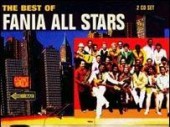MyGen
Profile Generator
The All-Stars are the house band of Fania Records, comprised of the label’s bandleaders, top sidemen and vocalists. The history of the band represents the rise and promulgation of salsa as a marketing tag for Latin music. The band’s start in recording was a promotional event with various artists, including Tito Puente of Tico Records and Eddie Palmieri and Ricardo Ray and Bobby Cruz of Alegre Records. Two recordings of the Fania All Stars: Live At The Red Garter volumes 1 and 2 (1968) were made but neither were very sellers. Typical of the groups classic sound is Echale Salsita.
In 1971 the second Fania All Stars concert was recorded and filmed live, resulting in Volumes 1 and 2 of the Fania All Stars Live At The Cheetah became the biggest selling Latin albums ever produced by one group from one concert.
After sell-out concerts in Puerto Rico, Chicago and Panama, the Fania All Stars made their first appearance at New York’s 63,000 capacity Yankee Stadium on 24 August 1973, with Fania’s leading lights Ray Barretto, Willie Colón, Larry Harlow, Johnny Pacheco, Roberto Roena, Bobby Valentín and others jamming with Manu Dibango, Mongo Santamaria and Jorge Santana (younger brother of Carlos Santana). Before the event, it was ambitiously predicted that the concert would revolutionize the music business like the Beatles in the early 60s and Woodstock in 1969. Material from their August 1973 Yankee Stadium concert and a concert at the Roberto Clemente Coliseum in San Juan, Puerto Rico, made up one side of Latin-Soul-Rock (1974).
In 1974, the All Stars performances at the 80,000 seat Stadu du Hai in Kinshasa, Zaire, were also filmed by Gast and released as the movie Live In Africa (1974, issued on video in the UK under the title Salsa Madness in 1991). This Zairean appearance occurred along with Stevie Wonder and others at a music festival held in conjunction with the Mohammed Alp/George Foreman heavyweight title fight.
The Fania All Stars return to the Yankee Stadium in 1975 resulted in two volumes of Live At Yankee Stadium (1975), which highlighted Fania’s and stablemates Vaya Records’ top vocalists Celia Cruz, Hector Lavoe, Cheo Feliciano, Ismael Miranda, Justo Betancourt, Ismael Quintana, Pete “El Conde” Rodriguez, Bobby Cruz and Santos Colón.
In Fania’s pursuit of a wider market for salsa, they made a deal with Columbia Records in the USA for a series of crossover albums by the Fania All Stars. The first project was a coupling of Steve Winwood with the All Stars reduced to a rhythm section consisting of Pacheco, Valentín, Barretto, Roena, Nicky Marrero and Papo Lucca, for the instantly forgettable Delicate & Jumpy (1976), released on Columbia Records in the USA and Island Records in the UK. Around that time, Island in the UK issued the Fania collection Salsa!, and Live by the Fania All Stars.
In 1976 the Fania All Stars made their one and only UK appearance with a memorable sell-out concert at London’s Lyceum Ballroom, with Steve Winwood guesting.
Prior to Delicate & Jumpy, the last “regular” Fania All Stars album on Fania for a couple of years was the solid Tribute To Tito Rodriguez, introducing Ruben Blades to the band. The Columbia series continued in lightweight vein with Rhythm Machine, again with the slimmed down Fania All Stars and keyboard player Bob James (executive producer) and guitarist Eric Gale guesting; and Spanish Fever (1978), with guests Maynard Ferguson, Hubert Laws, David Sanborn, Gale and others.
1978 also saw the release of Live, a “regular’ Fania All Stars album on Fania with a fully-blown version of the band recorded in concert at New York"s Madison Square Garden in September 1978. The last in the Columbia series, Crossover, appeared the following year, as did Havana Jam on Fania, which came from an historic concert recorded on 3 March 1979 in Havana, Cuba, featuring the All-Stars together with Billy Joel, Rita Coolidge, Kris Kristofferson, Stephen Stills and Weather Report, together with Cuba’s Irakere and Orquesta Aragon.
From 1980, Fania went into a downturn attributed to unsuccessful movie, agitation by artists for unpaid royalties, and the failure of the distribution deals with Columbia and Atlantic Records at catapulting salsa into the mainstream US market as expected. Moreover, the New York salsa scene, to which the label was inextricably linked, became eclipsed by the Dominican merengue craze in the first half of the decade and by the Puerto Rico-driven salsa romantica trend in the latter 1980s and early 1990s.
Reflecting the company’s decline, Fania All Stars’ releases slowed to a trickle as the 1980’s drew to a close. Their albums between 1980 and 1989 included the Latin jazz outings California Jam and the particularly feeble Guasasa; the crossover effort Social Change (1981) with guests Steel Pulse and Gato Barbieri; Bamboleo (1988) with four salsa-fied versions of Gypsy Kings hits; along with the sturdier Commitment, Latin Connection, Lo Que Pide La Gente and Viva La Charanga.
To mark the 20th anniversary of the band, Live In Africa, recorded in Zaire in 1974, and Live In Japan 1976 were issued in 1986. Thirty years of Fania Records was commemorated in 1994 by a three-city tour (San Juan, Miami and New York) by the reconvened All Stars.
